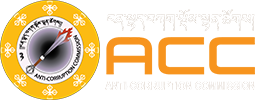About the Department
Investigation is one of the principal mandates of the Commission enshrined under section 25 (1) (f) & (g) of the Anti-Corruption Act of Bhutan 2011. The Department of Investigation (DoI) is one the three core departments of the Commission. The department represents an operation wing of the Commission and stands at the forefront in its fight against corruption. The purpose of the investigation function is to deter corruption through effective detection and investigation without fear or favour.
Investigation Policy, Management and Procedures
From the investigation perspective, irrespective of how serious an allegation may sound, the prospect of securing provable facts and evidence that could withstand the test of law and scrutiny of the reviewer becomes an overriding consideration before committing time and resources in investigating an allegation.
The Commission fully recognize the fact that public trust and institutional credibility can be at stake if legal powers bestowed upon the Commission are not applied judiciously with proper internal check and balance. The Commission had always and will continue to ensure that in pursuit of finding truth, its investigators handle the case with highest degree of professionalism, demonstrate firm and tenacity, and use coercive powers only when necessary and within the ambit of due process. The Commission take pride in the fact that there had been no recorded precedence till date where any of its officer conduct had ever maligned the integrity of a case due to procedural violation or breach of professional ethics and integrity.
At all times, the Commission remains guided by the following overarching policy and management practice as far as the investigation is concerned.
- No investigation in the Commission is initiated or closed based on a decision of an individual. From the time the complaint is registered until it is disposed, different tiers of committees are involved in the decision-making process.
- Investigation must not only be fair but also be seen to be fair in the eyes of the public.
- Investigation should be conducted in a timely, professional and efficient manner.
- All due process or procedural fairness applicable to criminal investigation must be followed.
- Investigators have to strictly abide by the code of conduct including disclosure of conflict of interest.
All investigations must be authorized by the Commission through a written order. The department cannot initiate any investigation on its own. Every investigation team is also embedded with one legal officer to provide legal services and attend to any court related activities. Prior consent of the Commission is also required in the event of exercising certain coercive powers. While the department and respective branches oversee the operational and tactical affairs of the investigation, the findings of every investigation have to be presented to an Investigation Review Committee who will review and recommend an appropriate course of action to the Commission. The investigation may result in the case being referred to the Office of the Attorney General for prosecution if there exists prima facie evidence of corruption, share with the agency for administrative action or sensitization or dropped altogether.
Since 2009, the Commission had developed an Investigation Manual to guide investigation officers with standard operating procedures that must be referred and complied with while conducting an investigation. These manuals have been revised and enriched in 2016 to accommodate changing needs. Again, to keep up with current working scenarios and operational changes, the manuals are being further revised by the department. In pursuit to drive the department’s productivity, efficiency and accountability, many facets of the investigation management process are being automated and streamlined in a digital ecosystem using Complaint and Investigation Management System (CIMS).
